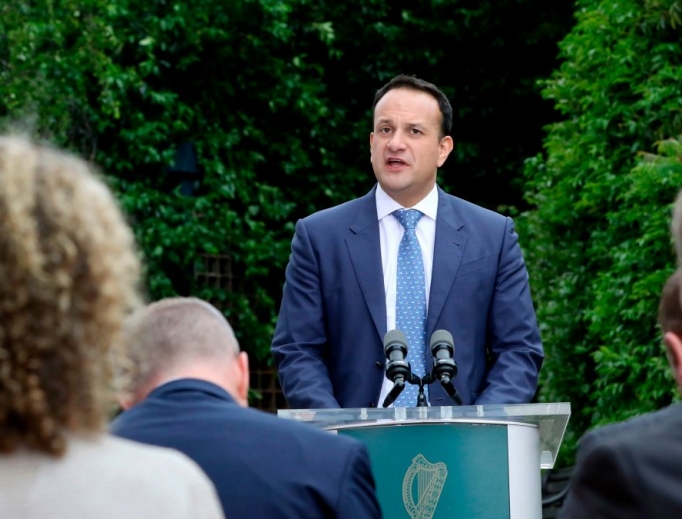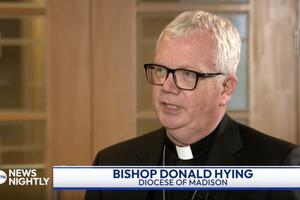Irish Prime Minister Tells Catholic Hospitals: You Must Perform Abortions
Critics say Leo Varadkar’s announcement, that upcoming abortion legislation will allow no exemptions for institutions, violates religious freedom.

DUBLIN — Irish Prime Minister Leo Varadkar, known as the Taoiseach, hailed the May vote for abortion as a sign that the country is now a more tolerant place, but his rhetoric rang hollow very quickly afterward.
While many would see very little of tolerance in the killing of unborn children in the first place, within days of the referendum — in which 66% of Irish voters opted to delete the constitutional protection of the unborn — Varadkar warned Catholic hospitals that they must comply with the new dispensation by providing abortions.
There would be no exception for Catholic hospitals in upcoming legislation mandating the provision of abortions, the Taoiseach said, despite the fact that Catholic hospitals occupy a small space in the Irish health care landscape — comprising only three of 32 acute-care facilities — and therefore abortions could be obtained elsewhere without difficulty.
The irony in Varadkar’s language, and in the widespread citing of “conscience” as justification for so many Irish Catholics casting referendum ballots in favor of legal abortion, was not lost on Bishop Alphonsus Cullinan of Waterford and Lismore.
“Isn’t it strange that on one side people who voted ‘Yes’ are being lauded for following their conscience and now we are trying to coerce people into doing something against their conscience?” he told the Register.
Bishop Cullinan, who is a moral theologian, said that if the government were serious about pluralism in health care in the wake of the May 25 vote, it would exempt Catholic hospitals from providing abortions.
“A Catholic hospital in an open and tolerant society should be respected and should be allowed to uphold its ethos in full,” he said. “Forcing the staff in a Catholic hospital to act against their ethos is not consistent with tolerance, openness and respect.”
The bind the hospitals face is not entirely new. In 2013, when abortion was first legalized in Ireland in limited circumstances, then-Health Minister James Reilly insisted that two Dublin-based Catholic hospitals list themselves as abortion providers.
The fact that the hospitals are state-funded, he warned, meant they must comply.
Conscience Concerns
The situation led to the resignation of bioethicist Father Kevin Doran from the board of the Sisters of Mercy-owned Mater Hospital in Dublin, after it confirmed in 2013 it would comply with the legislation.
“I have resigned because I can’t reconcile my own conscience personally with the statement, largely because I feel a Catholic hospital has to bear witness.”
“It’s about bearing witness to Gospel values alongside providing excellent care,” he told The Irish Catholic newspaper at the time.
David Quinn, the director of the pro-religious-freedom think tank The Iona Institute, called the government’s approach draconian.
“The policy means that if Catholic hospitals receive public funds, then they must become, in effect, state hospitals with only a veneer of a Catholic ethos.”
However, Archbishop Diarmuid Martin of Dublin, who as ordinary is canonically obliged to ensure Catholic institutions live up to their Catholic ethos, has not objected to Varadkar’s comments following the referendum. Archdiocesan spokeswoman Annette O’Donnell told the Register that “there is nothing new in the Taoiseach’s statement. It is the law in Ireland since 2013.”
“The archbishop is unaware of any conflict situation in that time,” she said.
Hospital insiders who spoke to the Register under condition of anonymity confirmed there had been no abortions in Catholic hospitals and said their boards only agreed to comply with the 2013 legislation because they were confident they would never be effected by its relatively narrow scope, as it provided for abortion only in cases of a threat to the life of the mother.
But Quinn said that’s simply not adequate as a justification for agreeing to comply. “This was a disastrous moral compromise,” he said. “Perhaps they compromised on the basis that, in practice, they would never have to perform an abortion on the suicide ground, and so in practice would never have to compromise their ethos. But they said they would, and this provided a terrible moral witness.”
Quinn added this 2013 action also meant that the hospitals have no ground to stand on when abortion laws are liberalized further.
“Perhaps they are still hoping that in practice they will never have to perform any terminations,” he said. “That might be a forlorn hope, because the planned law is very permissive.”
How to Respond
For Bishop Cullinan, Catholic hospitals compromising their ethos is not an option.
“The Catholic institution should resist, at all costs, being forced to act against deeply held beliefs,” he said.
For now, the government appears immovable. But Quinn believes that the hospitals are in a position to resist, should they decide to do that rather than sacrifice their religious convictions regarding the sanctity of life.
He cites the example of Dublin’s Mater Hospital, which has around 600 inpatient beds and receives tens of millions in taxpayer funds every year to treat tens of thousands of public patients.
“Would the government seriously force it to close in order to impose the abortion law upon it?” Quinn asked.
“It would certainly be high-stakes poker.”
It’s an issue that has been faced already by bishops in other countries.
In one U.S. case in 2010, Bishop Thomas Olmstead of Phoenix stripped St. Joseph’s Hospital of its Catholic status after it carried out an abortion.
Ireland’s law is currently only in draft form and is expected to be implemented by the end of the year. But Varadkar told the national parliament that while individual doctors will not have to performs abortions, “it will not, however, be possible for publicly funded hospitals, no matter who their patron or owner is, to opt out of providing these necessary services, which will be legal in this state once this legislation is passed.”
How should the Church respond, if such legislation does become law? Quinn insists two things must happen. “First, the bishops in whose dioceses these hospitals fall must say something,” he said. “They cannot be silent.
“Secondly, the hospitals themselves must say something. They have to say that they will never perform direct abortions and that they would prefer to close than do so.”
Michael Kelly is the editor of The Irish Catholic. He writes from Dublin.

















